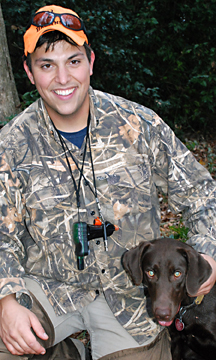Off the Beaten Path: Hunting & Hearing Loss
Posted on November 1, 2011 by bob in OffTheBeatenPath
According to some sources, 80% of shooting sportsmen/women have some degree of hearing loss. One commonly overlooked cause, says Montgomery Ear, Nose and Throat (ENT) surgeon Dr. Rick Love, is “…impaction of debris and cerumen, or wax, in the ear canal down onto the ear drum.” 
Shooters may push ear plugs in too far, or attempt to clean out the wax using cotton tips. This is not a good strategy, says Love.
“This action can push the cotton fibers into the wax and move the hardening mass deeper into the ear, causing an obstruction of the ear canal and a ‘conductive’ type hearing impairment.”
This type impairment can often be corrected in the office where an ENT specialist removes the plug of material.
Another common cause of diminished hearing is noise-induced. According to Love, sound blasts from a shotgun shell, pistol or rifle cartridge can create tremendous sound pressure energy.
“Every pull of the trigger,” he says, “creates an explosion loud enough to cause permanent damage and hearing loss,” whether it’s a .22 pistol, .410 shotgun or .357 magnum.
Love recommends wearing both hearing and eye protection, not only when shooting, but when observing others shooting as well.
“I am pleased that the training program developed by the National Rifle Association includes hearing and vision protection even with air rifle and air pistol activity,” says Love.
Protective implements range from inexpensive foam plugs to electronic devices using high-tech circuitry to dampen loud noises. Ear plugs provide minimal sound suppression and therefore minimal protection. Love says ear plugs are much more effective when used with shooters ear muffs, and recommends discarding foam plugs after each use to avoid the risk of infection.
According to Love, electronic noise-reduction devices are often favored by upland bird hunters and range shooters for the added safety they provide that allows for normal voice communication while offering full noise abatement and protection. Some deer hunters, he adds, may find these devices help them hear an approaching buck before they would otherwise have noticed rustling noises. The biggest drawback is price; they can cost as much as programmable hearing aids, or a new shotgun or rifle. For maximum effectiveness these units require a good fit inside the ear with a custom ear mold. Some sporting goods stores offer these devices, as do many hearing instrument dealers and some ENT doctors offices.
Ringing in the ears may be the first indication you’ve not taken adequate precautions to protect your hearing while shooting. Without proper protection, repetitive firing, at the range or on a bird hunt, can be very harmful. Love offered some signs to watch for that may indicate you have a hearing problem, noise-induced or otherwise:
— hearing but not understanding when others are speaking
— need for more TV or radio volume than those around you
— frequently asking others to repeat themselves or speak up
— difficulty with telephone conversations or in a noisy area
“Often hearing loss sufferers wait 12 months or more before seeking assistance,” says Love, something he strongly advises against.
“Sudden hearing loss can be a true medical emergency,” he says. “Shooters who have ear pain, or a sudden change in hearing that does not recover within an hour, should seek the help of an ENT specialist as quickly as possible. “
Love says recent research has many ENT doctors advising patients with blast noise exposure to take two aspirin tablets and two vitamin E capsules three times a day for 48 hours after unprotected exposure to a blast.
“This is thought to help the inner ear with cellular level biochemical recovery from the blast noise,” says Love, “and thought to mitigate the lasting damage of loud sound.”
A follow-up visit within two weeks after such treatment is recommended.
For more information on noise-induced hearing impairment, visit these websites:
— www.entnet.org/HealthInformation/hearingProtection.cfm
— www.entnet.org/HealthInformation/Noise-Induced-Hearing-Loss-in-Children.cfm
— www.nidcd.nih.gov/news/releases/11/Pages/101211.aspx
— www.nidcd.nih.gov/health/inside/spr03/pages/pg4.aspx
— www.nidcd.nih.gov/health/hearing/pages/noise.aspx
— www.cdc.gov/healthyyouth/noise/
— http://emedicine.medscape.com/article/857813-overview
— www.betterhearing.org/hearing_loss_prevention/noise_induced_hearing_loss/index.cfm
— http://nohrfoundation.org/prevention
Niko Corley spends his free time hunting, fishing and enjoying other outdoor activities. He can be contacted at cootfootoutfitters@gmail.com or follow him on Twitter @cootfootoutfitters.











One Response to “Off the Beaten Path: Hunting & Hearing Loss”